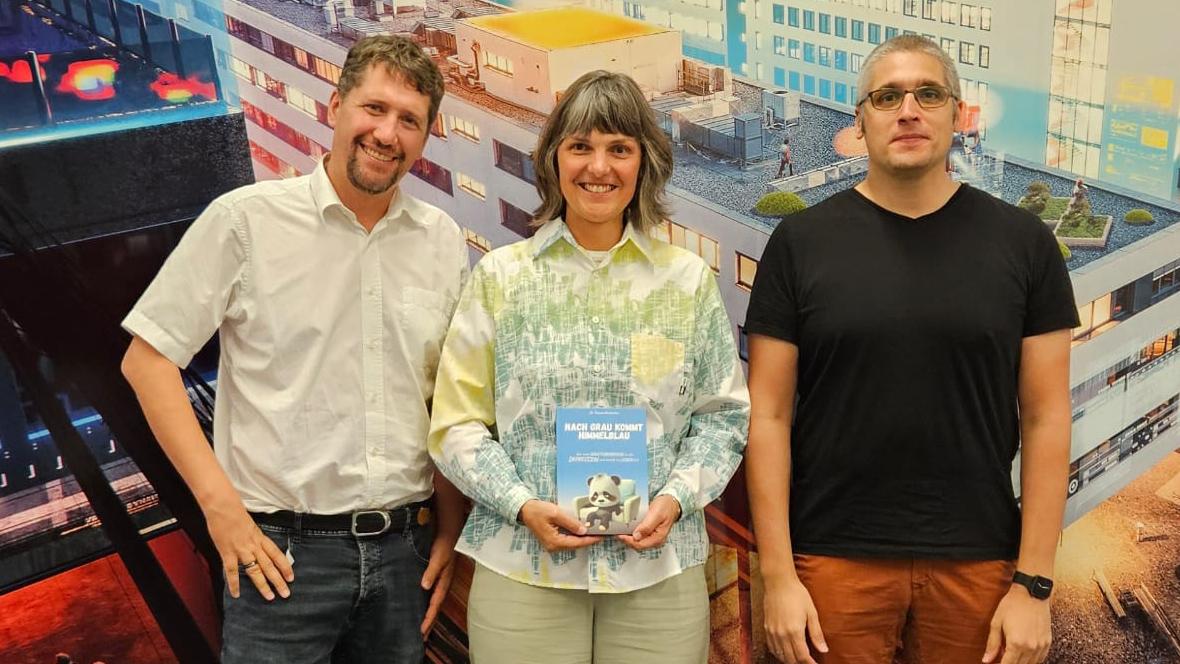Depression as a taboo subject: “It’s a widespread disease, not a character flaw”

26 September, 2023
At the Alumni Talk, Thomas Reinbacher spoke openly about his path from a dream career to psychiatry and back to life.
Universities like to focus on the success stories of their graduates. Thomas Reinbacher was invited to the Alumni Talk on September 25 at the Technikum Wien University of Applied Sciences and could have told many stories of success: Bachelor’s and Master’s degree at the Technikum, doctorate at the Vienna University of Technology, research at NASA, head of the product team for Alexa at Amazon in Munich. “That’s the Linkedin view on my life,” said Reinbacher. That evening, he was here to talk about another part of his life, which he has processed in the book “Nach Grau kommt Himmelblau,” or “After Gray Comes Sky Blue”.
It began two years ago. Based in Munich, Reinbacher led a team of 50 people at Google in the field of artificial intelligence, while also mastering the challenges of family life with his wife and their son. At some point, sleep problems set in and he couldn’t manage to relax even on weekends and vacations. In retrospect, he reports feeling like he was constantly on the road with a dead battery.
„You need help.“
Reinbacher ignored these warning signs. Two months later, his condition reached a new level. “My ability to concentrate suddenly fell off the face of the earth,” he said. “Until then, my head was my most valuable asset.” And then? He couldn’t even make sense of a simple email. It was his wife who first realized, “You need help.”
For the patient in the psychiatric ward’s admissions office, no longer able to fill out the sign-in sheet on his own, the message was: it’s best to stay here. He spent three months in inpatient treatment, followed by months of intensive therapy. Then it was finally time to return to work – too soon, as it turned out.
Eight weeks after rejoining Google, his condition darkened to the point where he and his partner had to fear for his life. Suicidal thoughts set in.
„This is my story to tell.“
Back at the hospital, it was again his wife who made the most important decision. She addressed the suicidal thoughts, which her husband denied. That meant admission to the closed area of the psychiatric ward. There, in the months that followed, Reinbacher struggled with his depression as well as acute side effects from the psychiatric drugs.
“At that point, the only thing that helped was acceptance of the situation. I told myself, ‘If Iget out of this and get a second chance, I’ll talk about it openly and honestly.’ This is my story to tell.”
It would take another year before Reinbacher can now say, “The sky is blue again.” And, “Artificial intelligence, doctoral studies, large-scale projects: it’s all children’s birthday parties. Getting out of that was the real tour de force in my life.”
„The majority of people try to deal with it themselves for a long time and only get help when it has really escalated.“
The book, and a new job as a speaker that began with the talk at the Technikum, is intended to show others that depression is something that can and should be talked about. According to the World Health Organization, one in three people will experience a mental illness in their lifetime. Far too few come to the awareness of getting help. “Many mental illnesses are very treatable. I believe I am the example that it is possible.”
Reinbacher advised attendees against various mindfulness tools and apps. “They’re all quick fixes,” the former software engineer said. His personal strategy is more comprehensive:
He described how he learned to accept weaknesses and see them in a new light. How he went into treatment to find his true values. And how, since returning to life, he has tried to worry less in stressful situations. In addition, it helps him to no longer be involved only in gainful employment, but also to give back in the social sphere.
“The majority of people try to deal with it themselves for a long time and only get help when it has really escalated.” Pointing out other ways of doing things should be this graduate’s next success story.
Everything about Thomas Reinbacher’s autobiographical book as well as, among other things, the possibility of booking him for lectures: himmelblau.jetzt
Pictured from left to right: Rafael Rasinger (Innovation, Scale up and Networks) und Mariella Müller (Head of Equality Management) with Thomas Reinbacher
Austria-wide:
Telephone counselling: 142 (emergency call), daily 0-24 hrs.
Telephone, e-mail and chat counseling for people in difficult life situations or times of crisis. Online at www.telefonseelsorge.at.
Vienna:
Social psychiatric emergency service/PSD: Tel.: 01 31330, daily 0-24 hrs.
Psychiatric emergency help in a crisis: This number provides qualified and rapid assistance around the clock.